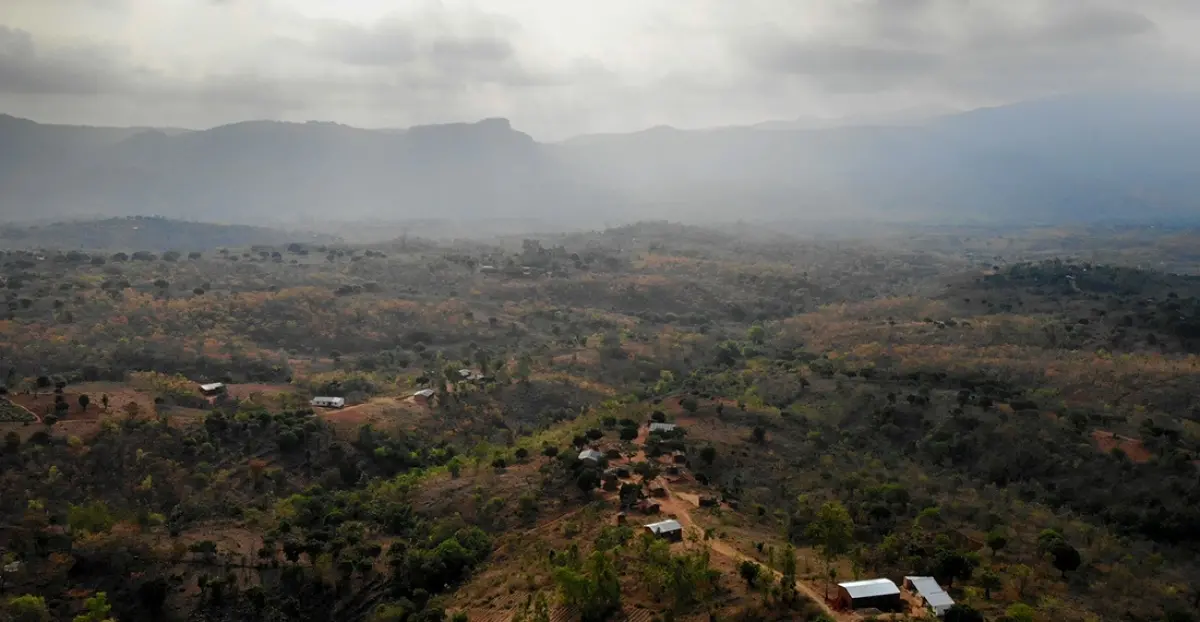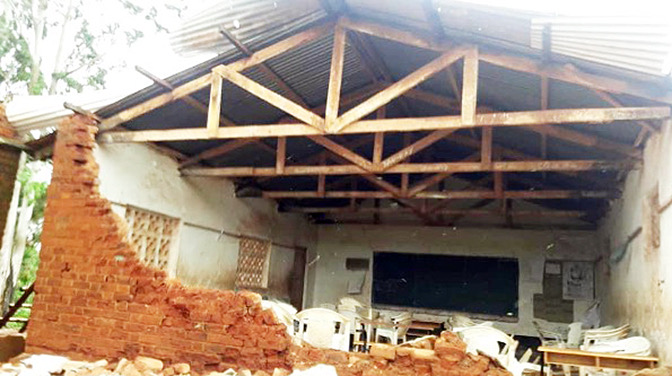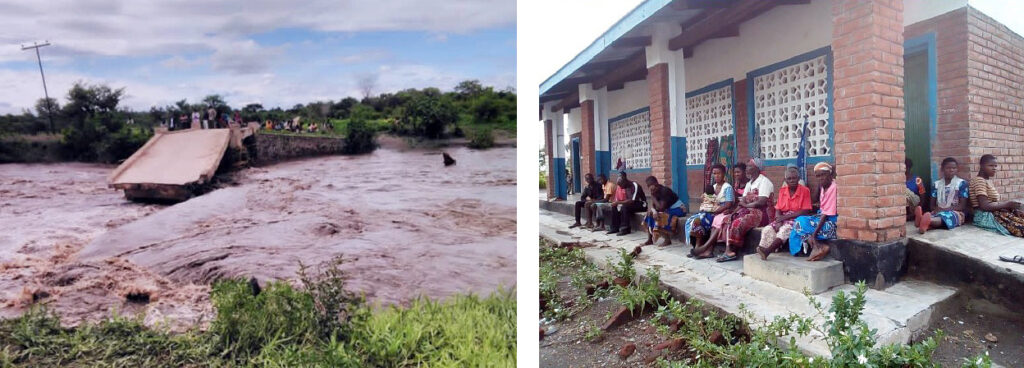Cyclone Rips Through Malawi Inflicting Massive Damage on Clinics, Homes

Heavy Rain, Strong Winds Cause Countrywide Blackouts, Destroy Schools, Bridges, and Roads
Updated on Feb. 11, 2022

UPDATE: February 11
According to the latest national data on Tropical Storm Ana’s toll in Malawi, a total of 46 people have died, 18 remain missing, and 206 are injured. More than 221,000 households and 945,000 individuals were impacted by the cyclone that swept through the country on January 24.
Additionally, 29 health facilities remain accessible and 29 are completely non-functional, according to the recent report. Over 190,000 people have sought shelter in camps, and crops across more than 100,000 hectares of land have been lost.
In Neno District, where Abwenzi Pa Za Umoyo (APZU), as Partners In Health is known in Malawi, primarily works in the South,: the response team has so far reached 2,800 affected people with emergency packages, says Dr. Luckson Dullie, APZU’s executive director. All six area camps continue to receive health care through a mobile medical team that visits twice a week. Pregnant mothers are being cared for in the maternal waiting homes. All health facilities are accessible and are being repaired, where necessary.
“All staff and 175 [community health workers] (CHWs) have already been reached with support,” Dullie says. We will start to explore different options for support towards resettlement. We will prioritize staff, CHWs, families in camps, and households with special needs.”
APZU staff visited Chikwawa and Nsanje Districts, farther south of Neno, for a rapid situation analysis., requested by the national government to support relief efforts. Dullie says Chikwawa is the worst, with over 80,000 households affected, with some residents in 83 camps. Only four of 23 health facilities are operating, the others remaining inaccessible largely due to flooding or other damage. Makhuwila health center on the eastern bank of the Shire River, a majority tributary running through the South, is an example of the dire situation, he says, as it was flooded and lost all medical supplies.
“This has left 90,000 people in its catchment area desperate for health care,” Dullie says. “In contrast, our lower Neno has a population of about 70,000 people. We have a functional community hospital with capacity for C-sections and other surgical procedures, a lab, X-ray, ultrasound scanning, and six health centers.
“The extent of damage also means that the resettlement of affected families and rehabilitation of the health system will require significant resources beyond the immediate response,” he continues. “Given our available resources, we are currently working with health care professional bodies to jointly put together emergency mobile teams to be deployed to the camps.”
UPDATE: February 1
Recovery efforts are underway after a powerful cyclone tore through Malawi on January 24, killing 33 people and injuring more than 150, according to a national disaster report on the wide-ranging impact of Tropical Storm Ana. At least 20 people remain missing, the report said.
Torrential rain and high winds caused widespread flooding, as well as downed trees and power lines in the country’s central and southern regions. The resulting damage was extreme, the report noted, with more than 190,000 households affected, and a range of losses, including collapsed homes, bridges, schools, health facilities, and churches; blocked roads; loss of livestock and destruction of crops; and contaminated water sources.
As a national disaster was declared on January 26, organizations, including Abwenzi Pa Za Umoyo (APZU), as Partners In Health is known in Malawi, are now focusing on relief efforts, notably assistance and support to the displaced individuals and families at camps across the region in dire need of food, temporary shelter, blankets, essential medicines, hygiene kits, and other supplies.
In Neno District, where more than 7,500 homes were destroyed, five temporary camps are now set up for displaced residents. APZU continues to assist district residents with financial, social, medical, and psychosocial support.
To ensure continuity of health services, APZU is providing immediate and long-term support to its staff, community health workers, and others in Neno District who were directly affected by the storm.
“This is why we supported with fuel for generators and water needs at the facilities for about four consecutive days when Neno had electric power outage from 24 January 2022,” said APZU Chief Operations Officer, Basimenye Nhlema. “This included supporting the transfer of oxygen from lower Neno to upper Neno until the power was restored on 27 January 2022.”
She added that the organization is also repairing various health facilities and assisting with temporary rehabilitation of roads to facilities in the district that were completely cut off.
To date, APZU has helped 60 families with relief items, including bags of maize and beans, liters of cooking oil, emergency funds, and a blanket for every household member.

UPDATE: January 28
Massive blackouts have plagued the country, with Neno District having no power supply for four consecutive days. The storm left the electrical infrastructure ruined from the main power plants. Health facilities continue to struggle to provide patient care and to adequately store medical supplies and equipment that require electricity and refrigeration.
Accessing backup power has been a struggle, as fuel tankers supplying the only filling station in Neno have been unable to reach it due to blocked roads.
According to Basimenye Nhlema, chief operations officer for Abwenzi Pa Za Umoyo (APZU), Partners In Health in Malawi, the team has arrived with back-up fuel reserves, supplying fuel for three health facilities—Neno District Hospital, Lisungwi Community Hospital, and Dambe Health Center. This support extends to two oxygen plants in the district.
Currently, APZU, through its extensive network of staff, including community health workers and site supervisors, is working closely with the local ministry of health and the Neno District Council through the Departments of Disaster Management Affairs Social Welfare and others to assess the full extent of damage and coordinate response.
Nhlema said APZU has also supported some displaced families with relief items, such as blankets, plastic buckets, maize, and direct cash transfers per affected household. Other needed items include food, tarps for roofing, clothes, blankets, mosquito nets, pails, and water treatment supplies.
UPDATE: January 26
A cyclone swept through Malawi Monday, part of Tropical Storm Ana, killing at least 14 people according to the BBC, injuring at least 14, and damaging more than 7,000 homes in the southern region of Malawi, including Neno District where Abwenzi Pa Za Umoyo (APZU), Partners In Health in Malawi, is located. Additionally, “the country has suffered a nationwide power cut and some areas have been declared disaster zones…Some 44 emergency camps have been set up to deal with thousands of displaced and injured people,” reports the BBC. A government declaration of disaster estimated that 28,216 households (216,972 people) were affected, though they recognize that many areas are still cut off from assistance.
Beyond Neno, almost 16,000 people in the south of Malawi have been affected, according to the Red Cross, as search and rescue operations continue after the first cyclone of the region’s season, as The Guardian reports.
Heavy rain and strong winds destroyed bridges and ripped the roofs off schools, according to a preliminary disaster damage report from the Neno District Council. Several health facilities in the area have roofs blown off, the report said, including a maternity waiting area. Widespread flooding has also been reported.
APZU Executive Director Dr. Luckson Dullie said that many more people remain missing. The team reports there are no staff casualties, but due to the high number of homes and property destroyed, “we expect there will be large numbers of people who have been displaced seeking refuge.” He said the team is planning to “immediately support 1,000 households out of the 7,000 that are particularly destitute. This initial support will include food, blankets, [and] basic household utensils. … Next phase will be urgent rehabilitation of damaged health facilities, especially as we are still early in the rainy season.”


The tropical storm’s path went straight through Neno, impacting 100% of the region in which APZU works, according to Dr. Patrick Ulysse, PIH’s chief operating officer. Initial reports on Tuesday estimated 1,000 households and 400 children affected, and the majority of school buildings were severely damaged. Ulysse reported that 12 of the 15 APZU-supported health facilities have been damaged, with many difficult to access and one completely inaccessible due to washed-out bridges and roads.
“There has also been a nearly countrywide power blackout for the last 24 hours, forcing facilities to rely on backup generators and inhibiting communication amongst APZU staff,” he said.
The team is simultaneously dealing with scarce access to fuel, which will continue to complicate outreach and relief efforts in the coming days and weeks. Over the past day, the APZU team has been working closely with the government and partners and will conduct more thorough assessments of damage and evaluate clinical and social needs as soon as the rains let up.
Given past experience with flood response in 2019, the team is certain a comprehensive response for the catchment area will be needed, including nutritional support, sanitation efforts, social support, and resettlement services for those who are displaced. Ulysse added: “As we have seen across PIH sites faced with acute disaster– whether an earthquake, storm, drought, or mudslide – this cyclone speaks to the direct and disproportionate impacts climate change has on the most vulnerable communities. We know these challenges will continue and our support for one another and our PIH sites around the world remains critical in 2022. “
Originally published on pih.org



